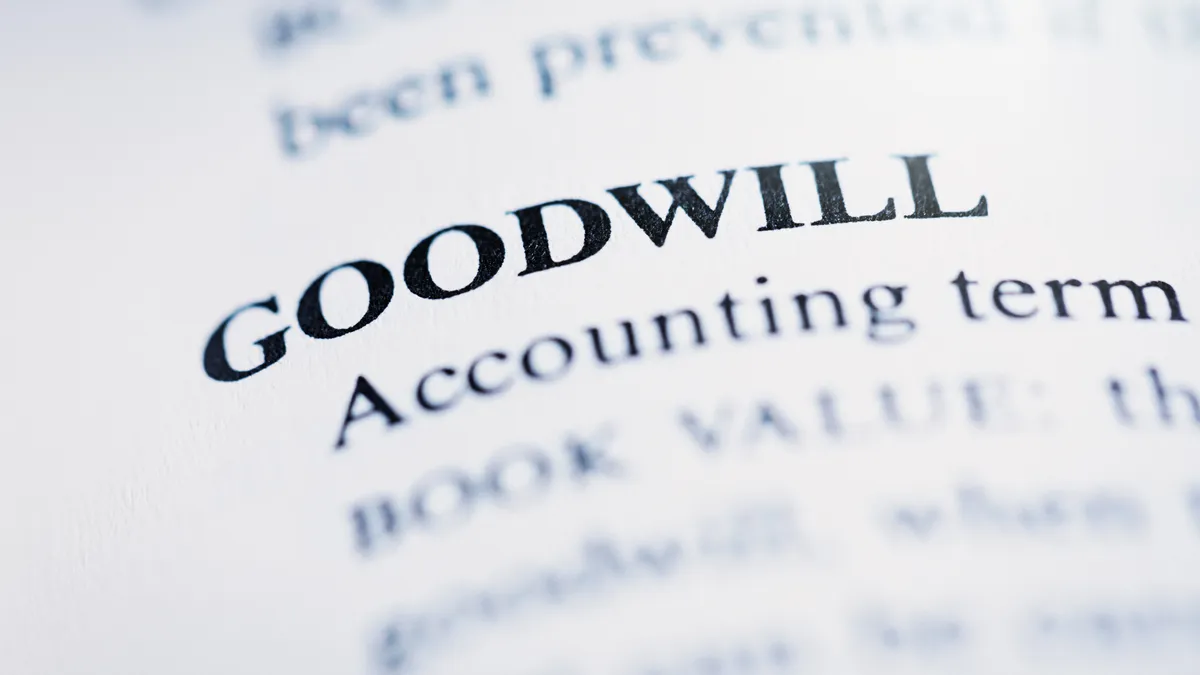Dive Brief:
- Goodwill impairments for 2022 are expected to rise above the $8 billion in write-downs taken last year based on an early assessment of more than 8,900 public U.S. companies, according to Carla Nunes, managing director at global consulting firm Kroll, formerly known as Duff & Phelps.
- The anticipated increase comes after the pandemic and the subsequent recovery whipsawed goodwill impairment levels, which fell dramatically last year according to preliminary numbers from Kroll, after doubling to $142.5 billion in 2020 from $71 billion in 2019.
- “Relative to 2021 I expect impairments to go up — and some of them might be related to impacts from the Russia-Ukraine conflict,” Nunes said, adding that the war’s impact comes on top of a general deterioration of the global economic outlook.
Dive Insight:
Nunes joins a rising chorus of voices calling out the potential for broader economic implications of the Russian invasion of Ukraine as the conflict continues. U.S. Treasury Secretary Janet Yellen, in testimony today before the House Financial Services Committee, said Russia's actions "will have enormous economic repercussions in Ukraine and beyond," according to CNN. Last week World Bank Chief Economist Carmen Reinhart, writing in Barron's, warned of "the potential fallout in financial markets from a likely default by Russia at some point."
While expectations for this year’s goodwill write-downs are speculative given it’s early in the year, Nunes anticipates that impairments will rise year-over-year in 2022 due to the global economic fallout from the war in Ukraine combined with soaring inflation and rising interest rates that had already disrupted the economy and stock market before the Russian invasion.
“If your margins deteriorate then you could have potential for more impairments, particularly if you have less cushion and if you’re closer to your impairment amount and then suddenly you have these disrupters,” she said.
Goodwill refers to intangibles above book value of a company at the time it is acquired by another company and Financial Accounting Standards Board rules require companies to assess any impairment to goodwill whenever there's a triggering event, such as a drop in stock valuation.
The impact of the war on impairments does not all stem directly from companies that have operations in Ukraine or Russia that they might need to write down, she said. In fact, U.S. companies have been involved in relatively few mergers and acquisitions in Russia that would trigger goodwill issues since about 2008, she said.
But depending on how long the conflict continues it could have an increasingly overarching impact on the global economy, she said. For example, it already has potential ramifications for a wide range of commodity prices for products that are big exports from Ukraine such as wheat and corn and others.
“If this continues and a lot of [Ukraine's] production capacity is destroyed by the war you have the potential for an even greater impact on food prices and that starts to impact inflation,” she said. In addition, spending will likely be dampened, particularly in Europe, as consumers have to tighten their budgets to offset higher electricity and power prices, she said.
Still, she does not anticipate impairment levels to rival those seen early in the pandemic, which were in turn dwarfed by the 2008 financial crisis, when impairment reached $188 billion, the most recorded in recent years. “The COVID crisis was so dramatic, the world economy almost stopped for several months. I don’t anticipate this conflict will cause the same level of economic impact as then,” she said, adding that some economic indicators such as the strong jobs market remain strong.
Nunes credited government stimulus programs that boosted consumer demand for goods for the year-over-year 94% drop in impairments to about $8 billion in 2021. “What we saw was an astounding recovery,” she said. At the same time, the impairments taken in 2021 may be a signal of triggers to come, she said. Many companies cited inflation, global supply chain constraints, and the effects of COVID-19 variants on their businesses as reasons for the write-downs. “They’re not going away in 2022,” she said.
Results of Kroll’s study of 2020 goodwill impairments showed that energy company goodwill impairments surged almost five-fold to an all-time high of $41.7 billion after oil prices and demand plummeted in the pandemic while in 2021 overall the industries that accounted for the largest share of impairments were health care (32%), financials (27%) in and consumer staples (17%). The top three 2021 impairments recorded to date included a $1.3 billion charge by Cardinal Health, Inc., a $1.1 billion charge by Prudential Financial Inc., and a $781 million charge by Xerox Holdings Corp., according to Kroll.














